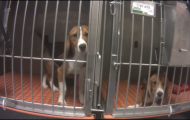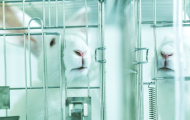Artificial intelligence, organ-on-chip technology and 3D bioprinting: These advancements promise to dramatically reshape our world, and they’ll play a part in making animal experiments obsolete. Sophisticated testing and research methods that use human cells or human biology-based technology will one day completely replace experiments on animals—a game-changer not just for animals, but for human health. The only question is how quickly it will happen.
As the world looks on in horror at images of Brazil’s Amazon rainforest engulfed in flames, many are asking why this important ecosystem is on fire, and what we can do to put out the flames once and for all. The situation is complex but there is one simple action we can take: we need to dramatically...
Brazil this week announced sweeping changes to its requirements for animal testing of agricultural pesticides, including eliminating the requirement for a controversial one-year toxicity test conducted on dogs. The move will potentially spare the lives of tens of thousands of animals used each year...
Today, the U.S. Fish and Wildlife Service announced it will be proposing a rule that would ban predator control on the National Wildlife Refuge System. When finalized, this rule will be a huge victory for countless wildlife living on refuges. The National Wildlife Refuge System is home to thousands...
Florida, in the midst of an explosion in the population of green iguanas, is actively encouraging residents to kill the animals “whenever possible” around their homes or on public lands. This irresponsible directive from the state’s Fish and Wildlife Conservation Commission is not accompanied by any...
In so many respects, scientific and technological innovation has defined this era—so it is nothing less than absurd that taxpayer dollars still fund animal experiments when non-animal approaches that could yield far better results for human health exist. That’s why we push to take the suffering out of science by, among other things, advocating for changes in how taxpayer funding is spent.
Because laboratories and research breeding facilities are closed-door operations, we don’t often have names and faces to identify the animals who suffer in the animal testing industry. But we know that there are millions of dogs, mice, monkeys and other animals like Montessa who need our help, and we continue to work tirelessly on their behalf. Over the last year, we have made great progress toward reducing and ultimately ending animal testing across the globe.
The world is moving toward a future dominated by sophisticated methods that use human cells, tissues and organs, 3D printing, robotics, computer models and other technologies to create approaches to testing and research that do not rely on animals. These methods are often faster, less expensive and...
While many of our Humane Society International colleagues are responding to the crisis in Ukraine, they continue to advance the vital priority campaigns that are the main focus of their work. In the United Kingdom, that includes the recent passage of “sentience” legislation that requires government...
With Gov. Kathy Hochul’s signature earlier this month, New York became the 10 th state in the U.S. to prevent the sale of cosmetics that have been newly tested on animals. This represents just the latest gain in a worldwide movement to end cosmetics animal testing on animals. Worldwide, we’re up to...
As 2018 draws to a close, so too does the 115th Congress. Each year, the federal team at our affiliate Humane Society Legislative Fund pushes hard to advance legislation that protects animals, and this year, we saw strong progress. Notably, in the Farm Bill signed last week by President Trump, we...
In the spring, wolf dens are usually full of young pups being raised by their parents and helper wolves, but when one den in Idaho was discovered vacant earlier this year, biologists worked on uncovering the reason. Today, the Washington Post reported that eight wolf pups from the Timberline wolf...

















